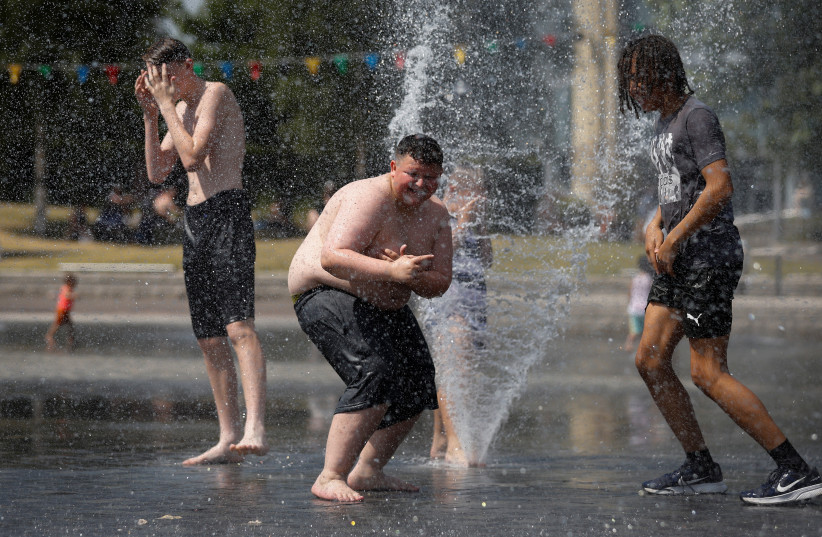LONDON – July 19, 2022, will be remembered as a high point in the annals of the much-storied British weather, when the mercury hit a staggering 40.2° Celsius. Measured at Heathrow Airport, it was a first-time temperature of over 40° on the islands in the “temperate zone,” where searing heat was never a part of daily life.
The onset of climate change is creating more heat waves with alarming regularity, and Britain is no longer a nation of temperate tempers and measured moderation. The hot summer is showing its toll even out in the open in the southeast of England, where the usually green lawns are parched and the crop fields resemble sand pits.
Young British schoolchildren have always been taught that hot desert winds and sweltering temperatures were the preserve of exotic desert climates, like the Sahara and Arabia, but they got a taste of that on their own doorsteps on Tuesday, when searing heat from the Iberian Peninsula made its way northward through the Bay of Biscay.
Heat events in this part of the world are often uncomfortable because of the breeze-less high humidity and paucity of home air-conditioning. But Tuesday’s was different. It bore more of a resemblance to Eilat, where a very hot, dry wind blows, keeping temperatures uncomfortably high. The only thing missing in London was the sting of sand grains hitting the face and legs.
At midday, as tempers soared with the temperature, in typical Middle-Eastern fashion, the driver of a London double-decker bus brutally honked his horn while a cabdriver, dropping off passengers, blocked the red bus’s path on a main route near a major London shopping area. Remonstrations followed, but fortunately, it didn’t get any worse or last too long, and typical order was restored.

It was a scene so typical of Tel Aviv, but in London? Horn honking has always been a major no-no, but will that change along with the climate? Apparently, these days, things are the same when tempers fray, no matter where you are in the world.
While we can now thank supercomputers for predicting weather trends with remarkable accuracy, assisting Britain’s weather forecasters to relay what was coming our way, some infrastructure struggled badly to cope.
Commercial jets and private vehicles impacted
The most bizarre event of Monday, the harbinger of Tuesday’s peak temperatures, occurred at Luton Airport, one of six international air hubs that serve the British capital. But service came to a complete halt when a patch of the runway tarmac melted under the scorching sun. Flights were diverted and thousands of holidaymakers waiting to take off crammed into the terminal, watching the flight board showing all departures delayed for hours or canceled.
Then, flights were wiped off the departures board in an instant, with no alternative plan offered, leaving thousands stranded at the unattractive airport. Luton, already known as one of Britain’s least-loved airports, left travelers wondering why others in far-hotter climes can manage to maintain the integrity of their runways.
Other public transportation services also struggled, and many trains were canceled because of fears that rails would buckle under the relentless heat.
Whether you are used to hot temperatures or not, this heat event isn’t the sort that anybody relishes. Especially Israeli tourists escaping to cooler places in the heat of our summer.
Trains were mostly empty as travelers switched to private car transport, putting a strain on Uber availability. If you book an Uber ride, make sure to choose the higher-priced “comfort” option to enjoy air-conditioning on your trip, instead of sweltering in the car. Otherwise, you are likely to end up in a vehicle in which the driver will prefer to save on fuel or electricity and say: “Sorry Guv, electric car, can’t use the air con because we won’t reach our destination. If you feel hot, just open the window.”
On Monday and Tuesday, the public was told to stay indoors and keep out of harm’s way, and it seemed that many obliged, as streets appeared remarkably quiet. The shopping malls were full, however, as people, who mostly don’t have adequate cooling facilities at home, sought refuge in modern public places.
If there is any consolation for locals and tourists alike in the southeast of England, it is that unlike in Israel, where we know that the heat will continue at least until the end of September, this heat wave will pass very soon, and temperatures will drop sharply, together with the arrival of some much-needed rain.
The trends are ominous, however, and who’s to say that another record-breaking heat wave won’t strike again soon.
The Environment and Climate Change portal is produced in cooperation with the Goldman Sonnenfeldt School of Sustainability and Climate Change at Ben-Gurion University of the Negev. The Jerusalem Post maintains all editorial decisions related to the content.
